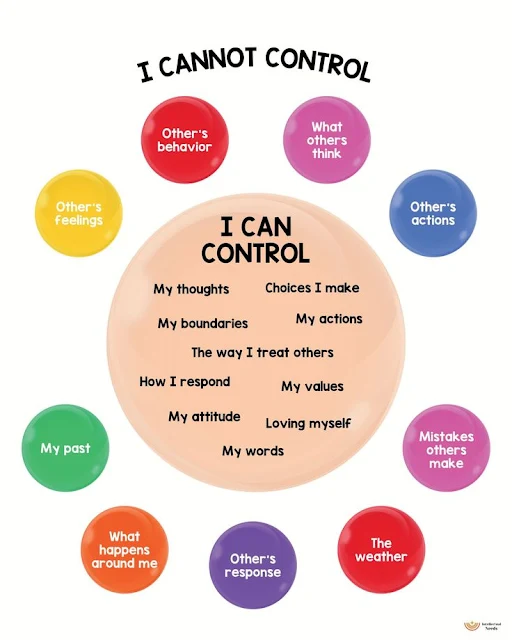(بسم الله الرحمن الرحيم، والصلاة والسلام على حبيبنا محمد صلى الله عليه وسلم وعلى من اتبع صراطه المستقيم.)
In the name of Allah, the Most Gracious, the Most Merciful. May peace and blessings be upon our beloved Prophet Muhammad (ﷺ) and upon all those who follow his righteous path.
Dear Readers,
(السلام عليكم ورحمة الله وبركاته.) May Peace, Mercy, and Blessings of Allah be upon you.
We have learned that mental well-being isn't a destination, but a continuous journey of self-care and mindful living. "Mental health is not a destination, but a process. It's about how you drive, not where you're going.” — Noam Shpancer. “You don’t have to control your thoughts. You just have to stop letting them control you.” — Dan Millman.
🧠 Top Principles for Maintaining Good Mental Health:
Positive Thinking:
Mental health thrives when one thinks positively about Allah and His plans. The Prophet ﷺ said: “I am as My servant thinks I am.”— Sahih al-Bukhari (7405), Sahih Muslim (2675). This encourages hopeful, resilient thinking, especially during difficult times.
Prayer (Salah):
Performing the five daily prayers provides structure, discipline, and a connection with Allah. It offers a moment of respite from the stresses of daily life.
Dhikr (Remembrance of Allah):
One of the most powerful tools for calming anxiety and achieving peace of mind. “Verily, in the remembrance of Allah do hearts find rest.”— (Surah Ar-Ra’d, 13:28). Regular dhikr (like saying Subhan Allah, Alhamdulillah, Allahu Akbar) and reciting Qur’an soothes the heart and reduces stress.
Practice Emotional Hygiene:
Just like we brush our teeth, it’s vital to clean our minds. Address your emotional wounds, avoid bottling up stress, and take time to acknowledge your feelings. Journaling, therapy, and talking with trusted people can help.
Prioritize Sleep:
Adequate sleep is fundamental for brain function and emotional regulation. As Matthew Walker, a renowned sleep scientist, states, "Sleep is your superpower."
Nurture Social Connections:
Strong social bonds provide support and reduce feelings of isolation. "Connection is why we're here; it gives purpose and meaning to our lives," as Brené Brown eloquently puts it.
Set Healthy Boundaries:
Learning to say "NO" is a form of self-respect. Avoiding toxic environments, reducing over commitment, and surrounding yourself with supportive people is key to long-term mental peace.
Practice Mindfulness and Stress Management:
Techniques like meditation and deep breathing can also help calm the mind and reduce stress.
Engage in Regular Physical Activity:
Exercise releases endorphins, which have mood-boosting effects. "Exercise is for the body and the mind," as Plato wisely observed.
Cultivate Healthy Coping Mechanisms:
Develop strategies for managing difficult emotions, such as journaling, creative expression, or talking to a trusted friend or therapist.
Cultivate Gratitude and Positivity:
Practicing gratitude shifts focus from challenges to blessings. Keep a journal to note three things you’re grateful for each day. Reframe unhelpful thoughts by focusing on growth opportunities instead of setbacks.
Maintain a Balanced Diet:
Nutritional deficiencies can impact mood and cognitive function. A healthy diet supports brain health. Incorporate omega-3s, leafy greens, and whole foods into your meals. Stay hydrated and limit stimulants.
Seek Professional Help When Needed:
Don't hesitate to reach out to a mental health professional if you're struggling. It's a sign of strength, not weakness.
More Tips:
- Break problems into manageable steps.
- View setbacks as opportunities for growth rather than failures.
- Engage in Self-Care Activities for yourself is essential.
- Explore hobbies like painting, writing, or cooking to foster creativity.
From my consulting experience, I've seen that small, consistent changes can have a profound impact on mental health. It's about building a lifestyle that supports your emotional well-being.
#emotionalwellbeing, #stressmanagement, #anxietyrelief, #positivethinking, #healthylifestyle, #innerpeace, #mentalhealthtips
Jazakum Allah Khairan. (جزاك الله خيرا.)
Disclaimer: This blog post is for informational purposes only and does not constitute professional advice. If you are struggling with anger management, it is important to seek help from a qualified professional.
Thank you for taking the time to read this inspiring story. We hope it has uplifted and motivated you to overcome any challenges you may be facing. If you found this information helpful like💙 , upvote ✅, clap 🙏🏼, comment 💯and share 📩 your thoughts or experiences in the comments below. Your engagement helps spread awareness and keeps our community informed and motivated. Let’s achieve our goals together!












.jpg)







0 Comments